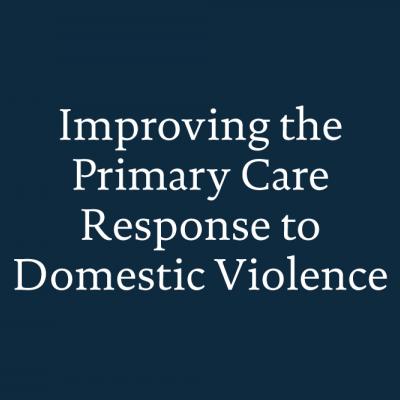Improving the Primary Care Response to Domestic Violence This programme funded work to ensure that women experiencing the health impacts of current or past domestic violence have direct access to a specialist domestic violence advocate-educator through their health professional

- Built on the Identification and Referral to Improve Safety (IRIS) project: an educational support approach for GP practices to help them identify and refer patients who are experiencing domestic violence.
- Ran for two years from 2010.
- Two specialist domestic violence agencies that delivered the original IRIS trial in Bristol and Hackney, East London, functioned as demonstration sites.
Background
We funded a trial, through our Engaging with quality in primary care programme, to test an educational support approach for GP practices to help them identify and refer patients who are experiencing domestic violence (‘Identification and referral to improve safety’ (IRIS)). Following the success of this trial, ‘IRIS – strengthening impact’ (IRISimp), an implementation programme to mainstream the IRIS model into practices across the country, began.
IRISimp built on the success of the IRIS trial. The overall aims were to ensure that women experiencing the health impacts of current or past domestic violence have direct access to a specialist domestic violence advocate-educator through their health professional, and that primary care clinicians are trained and competent in identifying and referring patients experiencing domestic violence to an advocate-educator or specialist service.
About the programme
This two-year programme began in June 2010 and involved encouraging commissioning of the IRIS model by primary care trusts and providing educator training.
The two specialist domestic violence agencies that delivered the original IRIS trial in Bristol and Hackney, East London, functioned as demonstration sites for IRISimp, and the original advocate-educators from these sites delivered the programme.
The programme team aimed to have a minimum of 12 primary care trusts commission the IRIS model by the end of the programme.
Evaluation included monitoring practice identification and referral rates, and evaluation of the training.
The team hoped to learn from real-life implementation of the IRIS model across a variety of primary care trusts to offer further evidence of the value of all primary care trusts investing in training in how to identify and refer patients experiencing domestic violence.
Work with us
We look for talented and passionate individuals as everyone at the Health Foundation has an important role to play.
View current vacanciesThe Q community
Q is an initiative connecting people with improvement expertise across the UK.
Find out more

